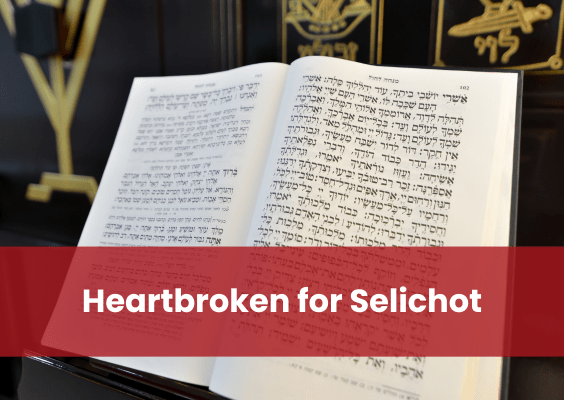
Derek Kwait
(Shana Bet Fellow ’13, Year Program ’12)
I want to talk about Selichot (the penitential prayers recited early in the morning or late at night from before Rosh Hashanah until Erev Yom Kippur) because it seems like not many other people do. I don’t blame them. After the first night, the service can feel like a real slog.
That’s probably why the Torah that does circulate around Selichot is typically focused on the service for the first night, which always draws the biggest crowd. But come back to shul at the crack of dawn Monday morning, and the hoard of Jews who showed up to wring their hearts out in penance two nights ago have been replaced by the usual morning crew blasting through that day’s Selichot at the speed of sound so they can finish the Shacharit service and still get to work on time.
Don’t misunderstand me. I’m not here to Selichot shame anyone. I am one of these Jews. Some of my most powerful Jewish experiences have occurred on the first night of Selichot, but by Monday, there I am again, in my house, also racing through the service so I can daven and maybe even eat breakfast, too, before leaving for work. I’ve even said them on the subway.
Somehow, this ritual has failed to make me a better person. Year after year I make the same mistakes, and year after year I moan that, what with my busy modern life, I don’t have the time to really do the serious introspection and spiritual accounting I always want to do this time of year. But at least I feel proud of myself for having said Selichot again every day.
This Elul, the truth finally caught up with me: Saying a fourth Ashrei each day is not going to smash open the gates of teshuvah (repentance). I needed to look for some Selichot inspiration. In the introduction to The Complete Artscroll Selichos, the volume I use, the authors write at length on how The Thirteen Attributes of Divine Mercy are a liturgy meant to be performed, not merely recited. It’s inspiring Torah, but it’s curious that they don’t really say anything similarly stirring about the 100 actual Selichot poems that make up the bulk of the services, let alone that fourth Ashrei. Rabbi Alan Lew, z’l, in This Is Real and You Are Completely Unprepared, devotes the book’s eponymous chapter to Selichot, but it’s clear he’s mostly talking about the service for the first night.
Something from that chapter really moved me, though: Where Lew calls Selichot the practice of cultivating heartbreak.
That was exactly what I had been longing to do all these years. But if dashing through dense medieval poetry while half-asleep and crabby isn’t cultivating heartbreak for me, what will?
I sat down and thought about which elements of the Selichot service move me the most. Then I made a long list of all the middot (character traits) and big life issues I wanted to focus on this coming year. I gave it some thought and decided I would try saying the traditional service up through that day’s first Selicha (yes, including that fourth Ashrei because old habits die hard), then sitting and reflecting on one midda as best I can for 10 minutes, then picking it up at Viduy (the communal confessions) and completing most of the rest of the standard liturgy.
(I should note here that Selichot is an easy service to personalize because there are so few halakhic [Jewish legal] requirements. This is not an endorsement of doing this same thing for any other service, and it is well established that teshuvah is not possible for sins committed because you took halakhic direction from a writer instead of a rabbi.)
About a week in, I wish I could end this piece with a grand pronouncement that this practice has been just the wake-up call I needed. That, after discovering this one weird trick that the rabbis hate, I’ve finally solved Selichot. That I feel connected to HaShem like never before and am a better husband, father, son, all-around Jew. That this is real and now I am completely prepared. But I can’t.
What I can say, though, is that I honestly am feeling something different. Rather than shoveling someone else’s words out of my mouth, I am breathing and thinking and really praying in the purest sense. I am focusing with no (or at least fewer) distractions and asking questions I haven’t asked myself since I was a Pardes student questioning everything, and the answers are making me uncomfortable. Maybe that’s heartbreak, maybe it’s just a heart fracture, but whatever it is, I’m coming away from this time feeling a lot and thinking about more, and I think that’s where real teshuvah begins.
Are you a Pardes alum with High Holiday Torah you would like to share? Send us your Torah at community@pardes.org!
Seeking more High Holiday Torah? Visit our High Holiday Torah Hub.
